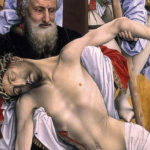
This is a summary Page of the main ideas of the four years of TODAY’S PAGE possible here, near the end of the third year, because the release of the manuscript in final editing is taken by me as the beginning of whatever ministry and meaning this project may have, first to my family, and then onward to the parents and students considering the meaning of Christian education for life and effective functioning for persons both in the natural/humanistic context (without consideration of deity) and in the natural/Christian context. Nature and Super-nature: The world system is the same for both Christian and non-Christian. A value system is built into the context of life and is articulated in Scripture, but is… Read more







